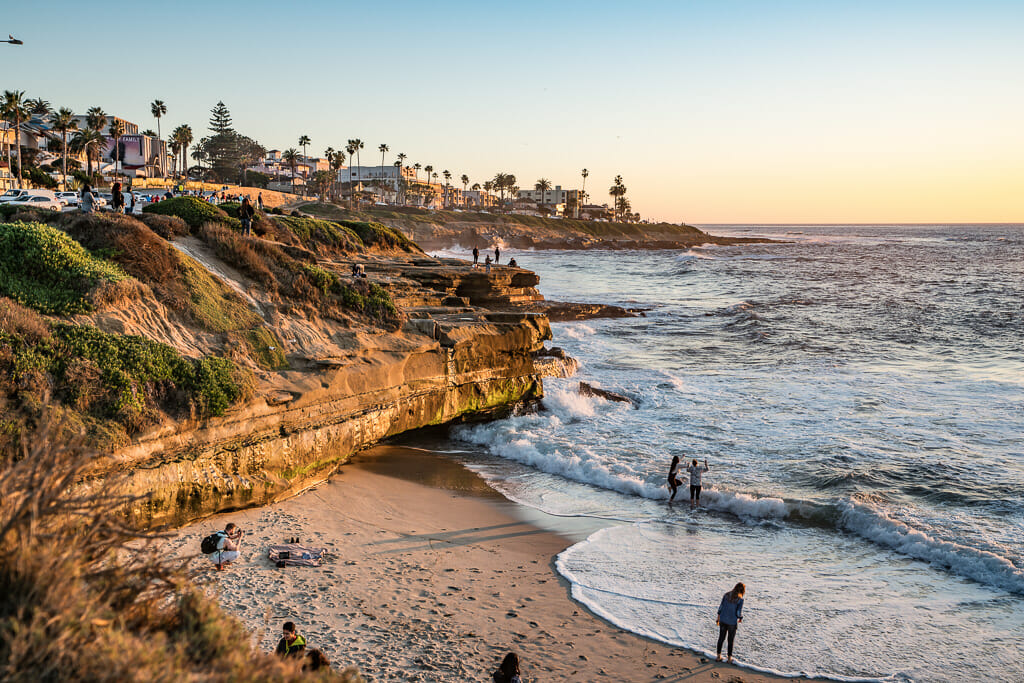Weather and Outdoor Activities
Southern California and South Florida both promise sunny beaches and warm weather year-round. However, the specifics of their climates differ in important ways. San Diego climate remains mild for most of the year, with average high temperatures in the mid-60s to low-70s Fahrenheit from November through April. Summers are warmer, with average highs rising into the low-80s in July and August. Rarely does the temperature exceed 100 degrees. While rainfall is sparse, persistent “May Gray” and “June Gloom” periods can leave the city overcast for days at a stretch. Underwater, San Diego waters typically range from the high-50s to low-60s during winter. Wetsuits are recommended for comfortable swimming and surfing most days outside of the warm summer months. The city boasts over 70 miles of coastline, perfect for beach activities like surfing, swimming, kayaking and paddleboarding whenever conditions allow. Nearby mountains offer hiking, biking and rocky coastline. By contrast, Miami enjoys balmier weather year-round. December through April feature average highs in the mid-70s with low humidity, making it one of the nicest places to be in the continental US during winter. While tropical heat and humidity build in summer, afternoon thunderstorms usually provide cooling relief. Miami waters remain swimmable at around 80 degrees without a wetsuit even in the winter months. With its tropical climate, Miami offers beach activities 12 months of the year. Watersports like sailing, kayaking and paddleboarding thrive in the calm harbors and inland waterways even when ocean surf is choppy. Beyond laidback beachgoing, the city pulses with outdoor festivals, boat and yachting events capitalizing on its nautical culture.
High Biodiversity in the Subtropics
South Florida’s unique subtropical ecosystem nurtures high biodiversity. Beyond sandy beaches, the region shelters hardwood hammocks, cypress swamps and coral reefs teeming with diverse plant and animal life. Spotting creatures like magnificent frigatebirds, green iguanas, white-crowned pigeons and Florida panthers remains possible with the right excursions.

Economy and Job Opportunities
While technology and biotech drive San Diego jobs in defense, telecommunications and life sciences, its economic base remains more specialized. The city progresses as a second-tier market compared to leading innovators like Silicon Valley or Boston. Miami benefits from proximity to booming Latin America and Europe. Its bilingual, international workforce and global connectivity through seaport and airport hubs power finance, trade, tourism and business services supporting head offices across the Americas. Reliance on real estate and hospitality brings vulnerability during downturns but rewards in strong periods.
Growing Venture Capital Scene
Encouraging signs emerge as startups flock to Miami’s low costs and warm lifestyle. A developed venture capital ecosystem now nurtures scalable companies in spaces like cryptocurrency, e-commerce, SaaS and biotech. While lagging Silicon Valley, Miami VC deal value surpassed cities like Boston, Chicago and Austin in 2021. Its appeal as a strategic beachhead to emerging markets distinguishes opportunity from other sunbelt destinations like Austin or Tampa.
Urban Amenities and Culture
Historic Old Town imparts San Diego charm amid iconic Balboa Park, the Gaslamp Quarter and Seaport Village. Lively beach communities from Pacific Beach to Coronado offer character but limited high-culture options. While craft brewing and tacos celebrate the laidback lifestyle, fine dining remains underwhelming for a major city. In contrast, Miami culture pulses internationally. Its diverse, immigrant-led society marries European flair with Afro-Caribbean and Latin rhythms. Deco District, Little Havana, downtown and Wynwood fuse history and street energy. Celebrity chef restaurants and nightclubs draw global jet-set crowds. Iconic art fairs and sporting spectacles activate public spaces year-round.
Arts and Entertainment Districts
As the most popular US destination for overseas visitors outside of New York, Miami welcomed over 20 million tourists in 2021. Revitalized neighborhoods like the Design District showcase luxury retail while Wynwood walls inspire creativity. Downtown and Coconut Grove center hyper-connected locals and global citizens at museums, performances and innovative startups driving tech, biotech and real-estate.
Housing Costs and Taxation
A high-demand market, major job centers like San Diego suffer chronic housing shortages pushing median home values over $750,000. Renters face limited affordable options outside far-flung suburbs dependent on long commutes. San Diego taxes weigh heavily, from state income taxes to some of America’s highest utility rates despite mild climate. While Miami real estate boomed during the pandemic, coastal home values remain around 30% below San Diego’s. Condos, townhomes and single-family neighborhoods offer affordable options within urban hubs or beaches like Miami Beach, Aventura and Pinecrest connecting to jobs via rail. Florida’s tax advantages preserve more pay over California with no state income levies offsetting loftier property taxes on investment real estate.
Rise of Remote and Hybrid Work
As remote work gains acceptance, locations like Miami gain a renewed competitive edge for Digital Nomads. Its relaxed regulations have attracted entrepreneurs establishing businesses serving regional and global clients. Courier and logistics infrastructure ensures fast delivery access to North America, Latin America and Europe via air and seaport connectivity.
Social Issues
San Diego confronts a visible homeless crisis concentrated downtown amid rising costs of living. Summer wildfires potentially impact air quality as drought worsens with climate change. While also at hurricane risk seasonally, Miami leverages dense urban planning with adequate shelter capacity to maintain one of America’s lowest homeless rates.
Cultural opportunities in Miami stem from diversity yet also pose linguistic barriers. Limited professional networks exist outside immigrant and expatriate circles compared to more established coasts. Meanwhile, San Diego nurtures an affluent yet provincial atmosphere where transplants assimilate comfortably within active military/university communities.
Overall, both cities foster high quality of life with tradeoffs depending on priorities. Their unique pros suit varying preferences for environment, industry and lifestyle. With remote work growth, coastal havens like Miami and San Diego increasingly compete as top places to live, work and play internationally. Each remains open to newcomers willing to embrace advantages while navigating challenges.

 Visiting China as a Non-Chinese Speaker
Visiting China as a Non-Chinese Speaker